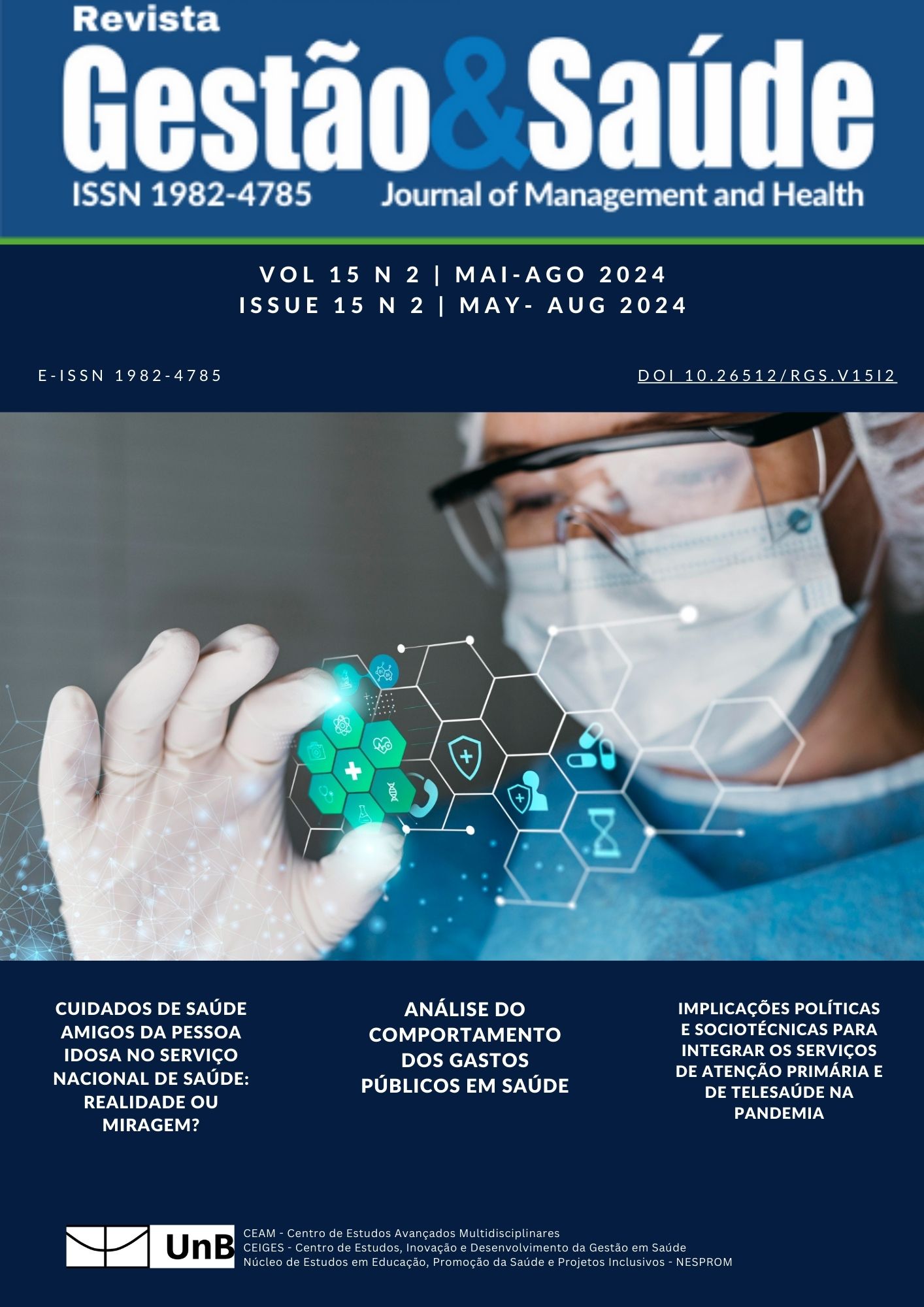Characteristics and trends in management and provision of contracted services in the SUS
DOI:
https://doi.org/10.26512/rgs.v15i2.54288Keywords:
Contracts, Counties, Management of Health Services, Unified Health SystemAbstract
The multiplicity of management modalities and provision of public health services and their different forms of contracting is one of the central challenges for the management of the Brazilian Unified Health System, known as SUS. Based on a matrix of analysis of the contracting of health services, the article analyzes, in a macro-region, characteristics and trends of the following modalities: public administration, private non-profit (philanthropic and social organization) and for-profit, state foundation of private law and public health consortium. This is qualitative research, of the multiple case study type, using secondary data and interviews, supported by the historical institutionalist framework. The results are presented from three dimensions (historical-structural, political-institutional and conjunctural) and variables, characteristics and trends of the researched modalities. Among them, the following stand out: the tendency towards commodification and outsourcing of services and workforce in the SUS, an aspect reinforced by modalities and actors linked to the public sphere, in addition to the disarticulation of modalities with the care network. The modality matters and to provide effective care to users it must be guaranteed through effective regulation, governance by public managers and social participation.
References
Ravioli AF, Soárez PCD, Scheffer MC. Modalidades de gestão de serviços no Sistema Único de Saúde: revisão narrativa da produção científica da Saúde Coletiva no Brasil (2005-2016). Cad Saúde Pública [Internet]. 23 de abril de 2018 [citado 3 de maio de 2021];34(4). Disponível em: http://www.scielo.br/scielo.php?script=sci_arttext&pid=S0102-311X2018000402001&lng=pt&tlng=pt
Andreazzi M de FS de, Bravo MIS. Privatização da gestão e organizações sociais na atenção à saúde. Trab educ saúde. dezembro de 2014;12(3):499–518.
Menicucci TMG. A relação entre o público e o privado e o contexto federativo do SUS: uma análise institucional. CEPAL. Série Políticas Sociais. n.196, 2014.
Hall P, Taylor R. As três versões do neo-institucionalismo. Lua Nova, n.58, p. 193-224, 2003.
Walt G, Gilson L. Reforming the health sector in developing countries: the central role of policy analysis. Health Policy and Planning; 9(4): 353-370. Oxford University Press, 1994.
Pereira AMM. Análise de políticas públicas e neoinstitucionalismo histórico: ensaio exploratório sobre o campo e algumas reflexões. In: GUIZARDI, F. L. et al (Org.). Políticas de participação e saúde. EPSJV; Recife: Editora Universitária - UFPE, 2014, 143-164p.
Souza FEA de, Nunes E de FP de A, Carvalho BG, Mendonça F de F. Hospitais de cidades pequenas: inserção e pactuação no Sistema Único de Saúde (SUS). Medicina (Ribeirão Preto). 14 de outubro de 2020;53(3):300–8.
Gerschman SV, Barbosa PR, Lima SML, Ugá AD, Portela MC, de Vasconcelos MM. O setor hospitalar filantrópico e alguns desafios para as políticas públicas em saúde. Revista de Administração Pública. 2003; 37(2):265 a 284.
Lima LD de, Scatena JHG, Albuquerque MV, Oliveira RAD de, Martinelli NL, Pereira AMM. Governance arrangements for specialized assistance in health regions in Brazil. Rev Bras Saude Mater Infant. 2017;17(suppl 1):S107–19.
Louvison MCP, Feurwerker LM, Tanaka OU, Akerman M, Rosa TEC, Bertussi D, Sitonio FT, Freire M. Acesso à atenção especializada em busca da integralidade no SUS. Anais do 12º Congresso Internacional da Rede Unida. Revista Saúde em Redes, v.2 n.1, Suplemento, 2016.
Marques ECL. Notas sobre redes, Estado e políticas públicas. Cad Saúde Pública. 2019;35(suppl 2):e00002318.
Ferreira MRJ, Mendes AN. Mercantilização nas reformas dos sistemas de saúde alemão, francês e britânico. Ciênc saúde coletiva. julho de 2018;23(7):2159–70.
Campos GW de S. SUS: o que e como fazer? Ciênc saúde coletiva. junho de 2018;23(6):1707–14.
Louvison MCP. Regionalização dos sistemas de saúde como resposta às desigualdades territoriais: um debate necessário. Cad Saúde Pública [Internet]. 2019;35(Cad. Saúde Pública, 2019 35 suppl 2):e00116019. Available from: https://doi.org/10.1590/0102-311X00116019
Ney MS, Gonçalves CAG. Reformas administrativas e o desmonte neoliberal do Estado brasileiro: desafios para o enfrentamento ao novo coronavírus. Physis. 2020;30(3):e300301.
Levi ML, Sousa J, Almeida CJ, Matsumoto K, Sussai S, Andrietta L, et al. Médicos e terceirização: percepções de trabalhadores e gestores sobre as transformações recentes no mercado de trabalho. Trab educ saúde. 2022;20:e00846199.
Sánchez-Martínez FI, Abellán-Perpiñán JM, Oliva-Moreno J. La privatización de la gestión sanitaria: efecto secundario de la crisis y síntoma de mal gobierno. Informe SESPAS 2014. Gaceta Sanitaria. junho de 2014;28:75–80.
Duarte LS, Leme Junior J de A, Santos JA, Felipe LV, Mendes ÁN. Tendências da mercantilização no SUS do estado de São Paulo: análise territorial dos gastos com convênios e contratos de gestão com Organizações Sociais. Saúde debate. dezembro de 2020;44(127):962–75.
Downloads
Published
Issue
Section
License
Copyright (c) 2024 ELECTRONIC JOURNAL MANAGEMENT AND HEALTH

This work is licensed under a Creative Commons Attribution-NoDerivatives 4.0 International License.
I declare that this article is original and has not been submitted for publication in any other national or international journal, either in whole or in part. I further declare that once published in the Electronic Journal Management and Health published by the University of Brasília, it will never be submitted by me or any of the other coauthors to any other means of scientific dissemination.
Through this instrument, in my name and in the name of the other coauthors, may I soon copy the copyright of the article to Electronic Journal Management and Health and declare that I am aware that failure to comply with this commitment will subject the violator to penalties and penalties Law of Protection of Rights Authorities (Nº9609, of 02/19/98).


